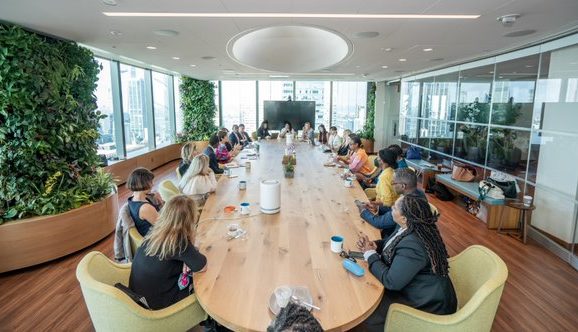Last month, Handshake marked the 77th United Nations Global Assembly by partnering with Salesforce.org to host a breakfast for practitioners and visionaries across business and philanthropy. The event took place on the 41st floor of Salesforce Tower near Bryant Park and delivered the kind of conversations that I know will inspire my thinking for the rest of the year and beyond.
One thing, above all else, is clear to me: the world of philanthropy and impact is in desperate need of disruption. The good news is, the solutions are right in front of us in the form of innovations developed by the private sector.
The time when ‘corporate giving’ meant an oversized check is over. Companies have to engage with the impact space in new ways – by introducing into the world of philanthropy the same level of expertise and problem solving that they bring to own their businesses.
The sector of philanthropy is primed for innovation and businesses are the ones to do it.
Because of our experience working with both private sector and nonprofit, Handshake is in a unique position to see the opportunities and strengths of both. We’re committed to the intermediary work of convening aligned partners to push this space forward.
I’m happy to say those partnerships and that innovative thinking is already happening across impact and philanthropy. The guests at Handshake’s breakfast – from Salesforce.org, to the African Visionary Fund, to Chobani founder Hamdi Ulukaya’s Tent Partnership for Refugees – shared the innovative ways in which their organizations are already bridging the gap with the private sector and shaking up a traditionally slow-moving space.
From shared storytelling to short timelines, the experts at the table surfaced nuts and bolts advice on co-creating successful and nontraditional partnerships that lead to healthy disruption and nimble action. We gathered up five key takeaways from our conversation. If you’re as excited about pushing this sector forward as we are, we hope you’ll join us.
- Make sure you’re speaking the same language.
The key ingredient to a successful partnership is communication. When partners from different sectors – whether impact, tech, business, or government – come together, they have to watch out for jargon and mistranslations that can cause confusion and hamper momentum. Do the work up front to translate all those disparate shorthands into language that’s legible to everyone. Veronica Rossini, Director of Marketing and Communications at Tent Partnership for Refugees unpacked how they use their founder Hamdi Ulukaya’s experience leading Chobani to inject the language of business into their own operations and communications. That means when Tent partners with for-profits their organizations are primed for clear communication. Whether it’s building decks for buy-in with stakeholders, or using research reports to show that hiring refugees advances the bottom line, Tent’s up-front work to meet businesses where they are makes every conversation go more smoothly.
- Use short timelines to build long-term buy-in.
Organizations that tackle global problems need to think in multi-year or even multi-decade timespans. But stakeholders who want to see early results and proof of concept? They need quick wins. The Salesforce.org team advocates for the simple solve of working in small, multi-month project timelines. These generate results that can be reported out to stakeholders. Those early ‘wins’ establish proof of concept and generate momentum that can earn short term buy-in for long-term vision.
- Reframe from “Have and Have Not” to “Win-Win”.
For too long, the impact space has used the frame of funders and recipients. Recipients bear the onus of earning and keeping the trust of the funder. That framework, according African Visionary Fund co-CEO Atti Worku, is paternalistic and exacerbates power differentials. Funders should aim to flatten hierarchies in the room so these disparities can be dispelled. By disrupting the narrative of generosity, partners can move from a relationship between ‘haves and have nots’ and focus instead on win-win solutions. That’s when real trust and mutual collaboration happens.
- Measurement is a kind of communication.
Interlocking partnerships make it important to confirm everyone is aimed at the same goal and measuring success in the same way. Salesforce.org points out how important it is to establish KPIs and metrics at the start of a project. Use schemas, make maps, create outlines for what success will look like for everyone. Like any common language, those numbers help partners stay on the same page and alleviate unease about the unknown. Commit to consistent and strong reporting, and clear metrics right out of the gate. It will help all stakeholders communicate.
- Level up local disruption.
Ideas are elegant and simple at a topline level. But grassroots expertise captures the unpredictable and the unexpected that is the heart of the impact space. More and more, that local expertise is being recognized as the engine inspiring global movements. Recognizing the pipeline from local to global, versus thinking of them as separate entities, reveals just how much the trends we call ‘global’ start on the ground.
